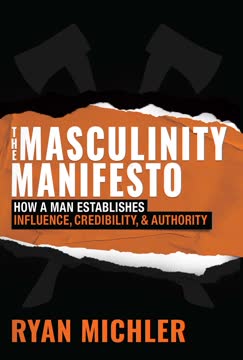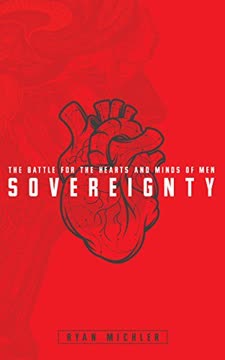Key Takeaways
1. Masculinity is a biological construct, not a societal one
Being a male is a matter of birth. Being a man is a matter of choice.
Biological vs. societal construct. Masculinity is not a societal construct, but a biological one supported by society. This distinction is crucial for understanding the innate qualities and tendencies of men. The similarities in masculine traits across cultures that have never interacted provide evidence for this biological basis.
Defining masculinity. Masculinity encompasses qualities regarded as characteristic of men, including:
- Stoicism
- Competitiveness
- Dominance
- Aggression
- Vigilance
- Violence
- Honesty
- Self-respect
These traits are neither inherently good nor bad, but tools that can be harnessed for productive or destructive outcomes. The key is learning to channel these masculine qualities effectively to benefit oneself and others.
2. Embrace the burden of responsibility to become a man
Do not pray for easy lives. Pray to be stronger men.
Responsibility as the path to manhood. Becoming a man requires embracing responsibility and overcoming challenges. This involves:
- Protecting those under your care
- Providing for your family and community
- Presiding as a leader in various spheres of life
Facing adversity. Men must be willing to face difficulties head-on rather than seeking an easy life. This approach builds character, resilience, and the capacity to lead effectively. By shouldering burdens voluntarily, men develop the strength necessary to navigate life's inevitable hardships and emerge as capable leaders.
3. Develop influence, credibility, and authority through leadership
No man will make a great leader who wants to do it all himself or get all the credit for doing it.
Key leadership qualities. Effective masculine leadership requires developing:
- Influence: The ability to impact others' thoughts and behaviors
- Credibility: Trust and reliability built through consistent actions
- Authority: The right to lead, often granted by others
Servant leadership. True leadership is not about dominating others, but about serving them. This involves:
- Putting others' needs before your own
- Empowering those around you to reach their potential
- Creating win-win scenarios that benefit both leader and followers
By focusing on these aspects, men can build lasting influence and respect, rather than relying on coercion or manipulation to achieve their goals.
4. Overcome modern comforts to build resilience and strength
We do not rise to the level of our expectations, we fall to the level of our training.
Dangers of comfort. Modern life has made many aspects of existence easier, potentially leading to complacency and weakness. To combat this, men must:
- Deliberately seek out challenges
- Manufacture hardship in controlled environments
- Push beyond their comfort zones regularly
Building resilience. By voluntarily facing difficulties, men can develop:
- Mental toughness
- Physical strength
- Emotional stability
- Spiritual depth
This preparation ensures that when inevitable life challenges arise, men are equipped to handle them effectively, rather than being overwhelmed by circumstances they're unprepared for.
5. Lead before you have the title by filling voids and taking initiative
Opportunity lurks where responsibility has been abdicated.
Proactive leadership. Men shouldn't wait for formal titles or permission to lead. Instead, they should:
- Identify areas where leadership is lacking
- Take initiative to fill those voids
- Demonstrate competence through action
Building credibility. By stepping up before being asked, men can:
- Prove their capability to lead
- Gain respect from peers and superiors
- Create opportunities for formal leadership roles
This approach requires courage and a willingness to take risks, but it's essential for developing true leadership skills and influence.
6. Harness masculine virtues for productive outcomes
A harmless man is not a good man. A good man is a very dangerous man who has that under voluntary control.
Channeling masculine traits. Rather than suppressing masculine qualities, men should learn to harness them effectively:
- Stoicism: Emotional control and resilience
- Competitiveness: Drive for self-improvement and innovation
- Dominance: Assertiveness in pursuit of worthy goals
- Aggression: Passionate dedication to objectives
- Vigilance: Awareness and preparedness
- Violence: Capacity for righteous self-defense
- Honesty: Integrity and truthfulness
- Self-respect: Confidence and self-worth
Balancing strength and control. The goal is not to eliminate these traits but to develop the wisdom and self-control to use them productively. This balance allows men to be powerful forces for good in their families, communities, and society at large.
7. Cultivate self-respect as the foundation of masculine leadership
The hardest victory is over self.
Self-respect as a cornerstone. Developing genuine self-respect is crucial for effective masculine leadership. This involves:
- Winning the internal battle against one's weaker nature
- Consistently making choices aligned with one's values
- Pursuing personal growth and excellence
Attracting respect from others. Men who respect themselves naturally:
- Command respect from others
- Attract positive relationships and opportunities
- Inspire those around them to improve
By focusing on self-improvement and maintaining high personal standards, men create a solid foundation for leadership that others naturally want to follow. This self-respect becomes the bedrock for developing lasting influence, credibility, and authority in all areas of life.
Last updated:
FAQ
What is "The Masculinity Manifesto" by Ryan Michler about?
- Explores Modern Masculinity: The book examines what it means to be a man in today’s world, challenging cultural narratives that masculinity is inherently toxic or outdated.
- Framework for Leadership: Michler presents a framework for men to establish influence, credibility, and authority in their families, workplaces, and communities.
- Action-Oriented Approach: The book is structured to help men move from self-improvement to leading others, emphasizing practical steps and mindsets.
- Biological and Archetypal Foundations: It argues that masculinity is rooted in biology and universal archetypes, not just social constructs.
- Path to Fulfillment: The core message is that fulfillment for men comes from responsibility, service, and overcoming adversity, not from the pursuit of happiness alone.
Why should I read "The Masculinity Manifesto" by Ryan Michler?
- Addresses Modern Male Challenges: The book tackles the confusion and lack of direction many men feel in a rapidly changing society.
- Practical and Actionable: Michler provides clear, actionable advice and frameworks rather than abstract theory.
- Focus on Service and Leadership: It emphasizes that true masculinity is about serving others and leading effectively, not dominance or selfishness.
- Personal Transformation: The author shares his own journey from despair to fulfillment, making the advice relatable and grounded.
- Counter-Narrative to Mainstream Views: For readers seeking an alternative to mainstream discussions on masculinity, the book offers a biologically and historically grounded perspective.
What are the key takeaways from "The Masculinity Manifesto" by Ryan Michler?
- Masculinity Is Earned: Being male is a birthright, but being a man is a choice and requires action, responsibility, and service.
- Three Archetypes: The core roles of a man are to protect, provide, and preside (lead), which are biologically and culturally universal.
- Influence, Authority, Credibility: Effective leadership is built on these three pillars, which must be earned through consistent action and service.
- Mindsets Matter: Four key mindsets—overcoming comfort, not being a superhero, leading before the title, and rendering oneself obsolete—are essential for masculine leadership.
- Harness Masculine Virtues: Traits like stoicism, competitiveness, dominance, aggression, vigilance, violence, honesty, and self-respect are not inherently toxic but must be channeled productively.
How does Ryan Michler define masculinity and manliness in "The Masculinity Manifesto"?
- Masculinity vs. Manliness: Masculinity is a set of biological traits and tendencies, while manliness is the productive harnessing of those traits for the benefit of self and others.
- Not a Birthright: Being a man is not automatic with age or gender; it’s a status earned through choices and actions.
- Service-Oriented: Manliness is defined by a man’s ability to protect, provide, and preside—serving those he is responsible for.
- Biological and Archetypal: The book grounds masculinity in both biological differences (hormones, personality traits) and universal cultural archetypes.
- Fulfillment Through Responsibility: True masculinity is expressed in bearing meaningful burdens and responsibilities, not in the pursuit of comfort or happiness.
What are the "Three Ps" (Protect, Provide, Preside) in "The Masculinity Manifesto" and why are they important?
- Protect: Men are biologically and psychologically wired to defend themselves and those they care about, which is foundational to their role.
- Provide: A man is expected to produce more than he consumes, ensuring the well-being of his family and community.
- Preside: Leadership is a natural extension of masculinity, involving guidance, vision, and selfless service to others.
- Universal Archetypes: These roles are found across cultures and history, indicating their deep-rooted importance.
- Well-Rounded Man: True manliness requires proficiency in all three areas, not just one, to be fully effective and fulfilled.
How does "The Masculinity Manifesto" by Ryan Michler address influence, authority, and credibility?
- Influence: Defined as the ability to impact others’ thoughts and behaviors without coercion; it is granted, not taken.
- Authority: Comes from recognized or granted power, often from external sources (bosses, society, God), and is necessary for effective leadership.
- Credibility: Built through a consistent track record of results and reliability; it is the foundation for both influence and authority.
- Compliance vs. Commitment: The book distinguishes between gaining mere compliance (through power) and true commitment (through influence and credibility).
- Practical Steps: Michler offers advice on building these qualities from the ground up, starting with small, consistent actions.
What are the four "Mindsets of Masculine Leadership" in "The Masculinity Manifesto"?
- Overcome the Ease of Modernity: Embrace discomfort and hardship to build resilience and avoid complacency.
- Don’t Be a Superhero: Avoid the savior complex; instead, empower others to solve their own problems and learn from failure.
- Lead Before the Title: Leadership is about action and responsibility, not waiting for permission or a formal title.
- Render Yourself Obsolete: The ultimate goal of leadership is to build other leaders, not create dependence on yourself.
- Internal Focus: These mindsets start with self-mastery and extend outward to effective leadership of others.
How does "The Masculinity Manifesto" suggest men should harness masculine virtues for productive outcomes?
- Embrace, Don’t Suppress: Traits like stoicism, competitiveness, dominance, and aggression are not inherently bad; they must be channeled constructively.
- Eight Masculine Virtues: The book details stoicism, competitiveness, dominance, aggression, vigilance, violence, honesty, and self-respect as key virtues.
- Biological and Social Utility: These virtues have evolutionary and societal value when used for service, protection, and leadership.
- Avoid Extremes: Each virtue can be destructive if misapplied; balance and intentionality are crucial.
- Practical Application: Michler provides tactics and exercises for developing and applying these virtues in daily life.
What practical advice does Ryan Michler give for building self-respect and fulfillment in "The Masculinity Manifesto"?
- Self-Respect Is Earned: It comes from consistent action, discipline, and overcoming the “natural man” (the weaker, passive self).
- Focus on Self-Improvement: Train your body, mind, and soul daily to build confidence and capability.
- Avoid Desperation: Pursue goals and relationships with purpose, not neediness or emotional dependence.
- Set Boundaries: Don’t allow yourself or others to treat you poorly; enforce standards for yourself and your environment.
- Serve Others: True fulfillment and self-respect are found in service, leadership, and empowering others.
How does "The Masculinity Manifesto" by Ryan Michler challenge the concept of "toxic masculinity"?
- Masculinity Is Amoral: The book argues that masculinity itself is neither good nor bad; it’s how it’s used that matters.
- Critique of "Toxic" Label: Michler rejects the blanket use of “toxic masculinity,” noting that both men and women can misuse their traits.
- Productive Channeling: The focus is on harnessing masculine traits for positive, productive outcomes rather than suppressing them.
- Biological and Cultural Roots: Masculinity is rooted in biology and universal archetypes, not just social constructs or negative behaviors.
- Societal Consequences: Suppressing masculinity leads to passivity, lack of fulfillment, and societal decline, according to the author.
What are some of the best quotes from "The Masculinity Manifesto" by Ryan Michler and what do they mean?
- “Being a male is a matter of birthright, being a man is earned.” — Highlights the distinction between biological sex and the earned status of manhood.
- “A man is not defined by what he thinks, his intentions, and/or what he hopes to accomplish someday. A man is defined by what he does or, more accurately, what he produces.” — Emphasizes action and results over intentions.
- “The work of men isn’t comfortable or convenient. But anything worth pursuing never is.” — Stresses the importance of embracing hardship and responsibility.
- “People don’t follow watered-down versions of men. They do, however, follow those with influence, credibility, and authority.” — Underlines the need for authenticity and strength in leadership.
- “If you want to build credibility, which is a requirement of leadership, be credible. Start small. Be consistent. Don’t fall backward.” — Encourages practical, incremental steps toward building trust and respect.
How can readers implement the lessons from "The Masculinity Manifesto" by Ryan Michler in their own lives?
- Create a Personal Manifesto: The book encourages readers to reflect on key questions and write their own guiding principles for manhood and leadership.
- Daily Practice: Implement the mindsets and virtues through daily habits—physical training, mental growth, and service to others.
- Share and Review: Share your manifesto with those impacted by your actions and regularly review your progress, adjusting as needed.
- Focus on Action: Move beyond reading and theory to consistent, practical action in all areas of life.
- Build Community: Seek out or create a band of brothers or supportive community (like Michler’s Iron Council) for accountability and growth.
Review Summary
The Masculinity Manifesto receives overwhelmingly positive reviews, with readers praising its actionable advice on embracing traditional masculine virtues. Many appreciate Michler's perspective on leadership, personal growth, and the importance of men taking responsibility. Reviewers find the book's structure and writing style accessible, with practical exercises for implementation. Some note its relevance in today's cultural climate, viewing it as a counterpoint to negative portrayals of masculinity. A few critics mention religious undertones, but overall, readers consider it a valuable guide for men seeking personal development and positive impact.
Similar Books
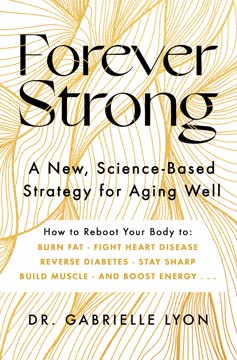


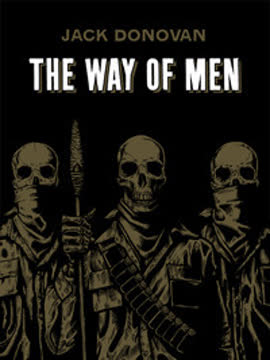

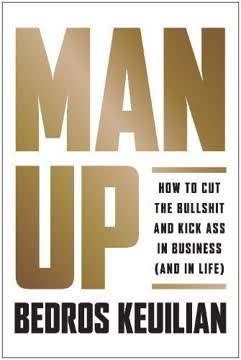




Download PDF
Download EPUB
.epub digital book format is ideal for reading ebooks on phones, tablets, and e-readers.
